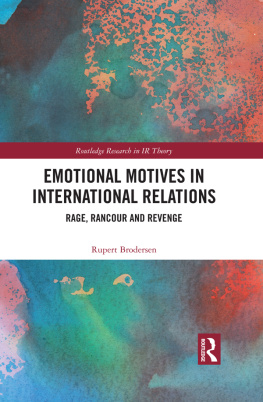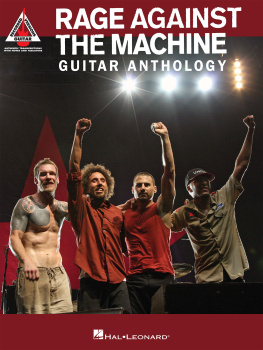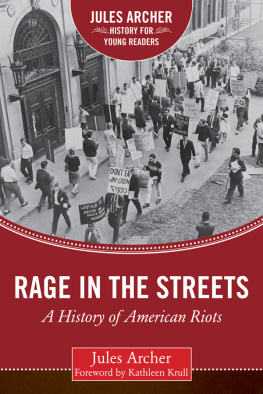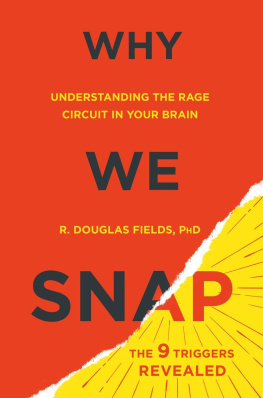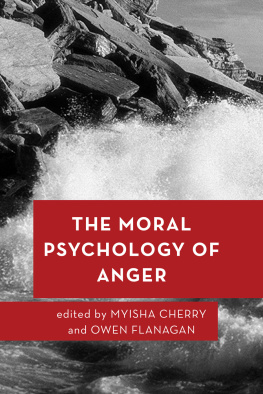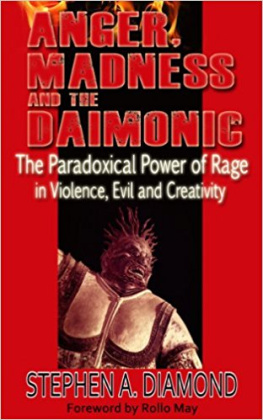Emotional Motives in International Relations
The study of emotions in International Relations is gaining wide-spread attention. Within the emotional turn in IR the emotion of rage however has not been given sufficient attention, instead being used as shorthand for irrationality and excess.
Rage is arguably one of the oldest and most destructive emotions in human affairs. This book offers an innovative approach that seeks to split rage into its traditional manifestation of aggression and violence, and into a less visible, passive manifestation of Nietzschean Ressentiment . This model facilitates a comprehensive understanding of revisionist motivation, from the violence of ISIS to the oppositionism of Putins Russia. The aim is to illustrate how a lack of violence can belie vengeful impulses and a silent rage, and how acts of violence, regardless of brutality, are often framed as a type of justice and moral imperative in the mind of the aggressor. This book raises serious questions and concerns about legitimacy and order in global affairs and offers a firm theoretical basis for the exploration of present-day conflicts.
Rupert Brodersen received his PhD in International Relations from the London School of Economics.
Routledge Research in IR Theory
1 Politicising Ethics in International Relations
Cosmopolitanism as Hospitality
Gideon Baker
2 Social Justice, Global Dynamics
Theoretical and Empirical Perspectives
Edited by Ayelet Banai, Miriam Ronzoni and Christian Schemmel
3 Reinhold Niebuhr and International Relations Theory
Realism beyond Thomas Hobbes
Guilherme Marques Pedro
4 Emotional Motives in International Relations
Rage, Rancour and Revenge
Rupert Brodersen
First published 2018
by Routledge
2 Park Square, Milton Park, Abingdon, Oxon OX14 4RN
and by Routledge
711 Third Avenue, New York, NY 10017
Routledge is an imprint of the Taylor & Francis Group, an informa business
2018 Rupert Brodersen
The right of Rupert Brodersen to be identified as author of this work has been asserted by him in accordance with sections 77 and 78 of the Copyright, Designs and Patents Act 1988.
All rights reserved. No part of this book may be reprinted or reproduced or utilised in any form or by any electronic, mechanical, or other means, now known or hereafter invented, including photocopying and recording, or in any information storage or retrieval system, without permission in writing from the publishers.
Trademark notice : Product or corporate names may be trademarks or registered trademarks, and are used only for identification and explanation without intent to infringe.
British Library Cataloguing-in-Publication Data
A catalogue record for this book is available from the British Library
Library of Congress Cataloging-in-Publication Data
A catalog record for this book has been requested
ISBN: 978-0-8153-8667-4 (hbk)
ISBN: 978-1-351-17530-2 (ebk)
Typeset in Times New Roman
by Apex CoVantage, LLC
The study of emotions in International Relations (IR) has gained considerable traction. An over-dependence on rational actor models and narrowly defined interest-based politics has given way to new modes of analysis that attempt to explain state behaviour through a richer understanding of motivation and goals. Emotions, however, are not new to International Relations scholarship; they feature in classic works by Thucydides or Thomas Hobbes, whose influence on International Relations cannot be denied. These thinkers were pre-occupied with the emotion of fear, an emotion they believed to be the source of much failure and misery in international politics. This assessment was later reiterated by Robert Jervis, as he would lament the distorting impact of fear in his seminal study Perception and Misperception in International Relations . There was the belief that reason and sound judgement could banish fear and, by extension, its political manifestation of warfare and insecurity. And so, while the study of emotions, fear specifically, has always been part of IR scholarship, it was accompanied by an undeniable Enlightenment bias that emotions as a whole are distorting and stand in opposition to reason, progress and peace.
Earliest attempts to introduce a more balanced view of emotions into IR scholarship occurred by way of Neta Crawfords seminal essay The Passion of World Politics , where she argued convincingly that both traditional schools of IR scholarship, Neo-Realism and Neo-Liberalism , were heavily influenced by emotional considerations. Anderson stressed the importance of positive emotions in the origins of national identities. Rather than a source of distortions and failure, these emotions were the glue that held groups together and created the basis of statehood, on which traditional IR scholarship so heavily relies.
However, Crawfords essay was published a year before the Realists worst fears came to be realized. The attacks on the Twin Towers forced the study of emotions in IR out of a comfortable back seat into the front seat. A flood of new papers and books attempted to explain the terrorist attacks, along with the USs response, drawing on different fields in the humanities, like sociology, group psychology and affect theory to explain motivation. New sub fields of study opened up in IR scholarship, focusing on concepts like humiliation, slights, trauma or ontological security to explain the motivation behind violence and terrorism.
However, the initial intellectual enterprise commissioned by Crawford, to re-situate the role of emotions in IR scholarship, was not abandoned. Despite the flood of publications stressing the causal mechanisms between anger and violence, important theoretical questions remained unanswered. A single terrorist can certainly be emotionally motivated, but can a state act emotionally? How does a state feel? Within the growing body of IR literature on emotions, these fundamental questions are referred to as the Macro Approach to emotions in IR, attempting to construct a theoretical foundation for the study of emotions in international politics. Scholars like Mercer and Sasley argue that social identity rests on individuals identifying as a member of a group, in turn allowing the group to exist and feel through its members. Neta Crawford argues that emotions are institutionalized through state practices, such as the espousal of Neo-Realist or Neo-Liberal foreign policy, or on the micro level through social practices that both respond to and entrench emotions, like the heightened security at airports or transit hubs that attempt to respond to a sense of insecurity but end up only reinforcing the emotion. Scholars like Ned Lebow or Todd Hall place the site of emotionality with political leaders and their immediate group of advisors, arguing that a small group of people gathered in the Oval Office can easily be proved to act emotionally in their decision making, while Hall argues that foreign policy elites use emotional displays as deliberate, strategic signals.
Against this more theoretical Macro Approach stands the Micro Approach to emotions in IR. These more empirically focused investigations posit a causal mechanism to explain state behaviour. The experience of humiliation, trauma, slights or ontological displacement is sought to explain emotional reactions, which, in turn, engender a certain, mostly fixed, pattern of behaviour. Within this Micro Approach field, it is worth making a further distinction between scholars concerned purely with action tendencies, that is how an emotion leads to an action, and those also paying close attention to changes in cognition, that is how an emotion affects the brain. The first group establishes clear causal mechanisms; for instance, an experienced act of humiliation must lead to an act of revenge or counter-humiliation or simply lashing out. The neurological turn in IR has successfully decoupled emotions from their objectively perceived actions; in other words, we no longer need to search for a performative manifestation to prove the existence of an emotion, a somewhat crude enterprise, but instead can search for more refined expressions of emotional manifestations by way of changes in group cognition.

